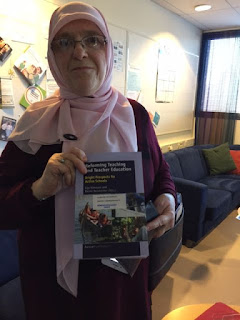As we entered the teacher’s lounge of the primary school at the University of Jyväskylä Teacher Training School, we noticed several volumes on display, including an edited book by Eija Kimonen and Raimo Nevalainen. As we finished our mid-day school lunch Raimo, a Lecturer at the university, gave me a warm welcome and kindly shared a copy of the book, Reforming Teaching and Teacher Education: Bright Prospects for Active Schools (2017). The edited volume includes chapters by contributors from Finland, China, Japan, Latvia, Norway, Romania, and the United States.
 |
| Tour participant National Louis University faculty member Seema Imam holding a copy of the book in the teachers' lounge at the primary school at the University of Jyväskylä |
The chapter
that is perhaps of most interest to those of us who went on the 2017 NLU Study
Tour is “Educational Change and School Culture:
Curriculum Change in the Finnish School System” (Nevalainen, Kimonen,
& Alsbury). This is because many of us went to Finland to consider what may
be different in the preparation of teachers and the conduct of school. The authors summarize current education
changes occurring around the world, including reform focused on:
·
standardization over contextualization,
·
efficiencies over human agency,
·
centralized over localized locus of educational control,
·
policy-oriented over empowerment-oriented teacher professionalism, and on
·
school choice. (p. 197)
They contrast
these reforms around the world with Finnish education and, in some cases, with findings
from studies completed by the Organization for Economic
Co-operation and Development (OECD).
The remainder of the chapter is devoted to a discussion of curriculum,
both a brief history of approaches to curriculum (classical vs. idealistic) for
Finnish comprehensive schools (lower level, grades 1-6; and upper level, grades
7-9) from 1970 to 2014 and consideration
of the connection between curriculum and school culture. One interesting
section discussed a 1990’s focus on dynamic school-developed curriculum:
A school organization that
follows a school-based curriculum has its own culture that can be changed and
improved. This requires collegial cooperation
and in-depth reflection on thought and action models. The objective is to
empower teachers to influence the direction and development of reforms. (p.
216)
However, not all teachers welcomed this opportunity, sensing a lack of
their own preparation for this work, concern with the time to be invested, and
finding collaboration to be a challenge in their school setting.
Nevalainen,
Kimonen, and Alsbury conclude the chapter with a description of the new 2014
Finnish National Core Curriculum and a recognition of the need for continuing
education for teachers to enact the curriculum as it is phased in between
2016-2019. New concepts in the
curriculum “include ‘school culture,’ which is based on a learning community,
and ‘transversal competence,’ which refers to the competences needed in the
future” (p. 213). Seven interconnected
competence dimensions are described:
(1) thinking and
learning to learn;
(2) cultural
competence, interaction, and self expression;
(3) taking care of oneself
and managing daily life;
(4) multiliteracy;
(5) ICT competence;
(6) employability
competence and entrepreneurship; and
(7) participation,
involvement, and ability to build a sustainable future. (pp. 213-214)
The authors
conclude that “development of transversal competencies in students, as well as
the creation and implementation of local curricula, all require schools and
teachers to promote a collegial and collaborative school culture” (p. 214).
They view the school as a learning organization “which requires teachers to
critically reflect on their own operating principles and practices as well as
to renew them, in other words, they have to create a new school context” (p.
215).
As our visit to the Teacher Training School at the University of Jyväskylä came to a close, we learned more about changes in the preservice teacher preparation curriculum to enable future teachers to effectively implement the 2014 Finnish National Core Curriculum, including competency to lead change in the development of school culture. This echoed an introductory presentation we had heard earlier in the week on the renewal of teacher education by a speaker from the Ministry of Education and Culture (presentation by Sanna Vahtivuori-Hänninen, March 27, 2017).
 |
| Slide from presentation by Sanna Vahtivuori-Hänninen |
References
Nevalainen, R., Kimonen, El,
& Alsbury, T.L. (2017). Educational change and school culture: Curriculum change in the Finnish school
system. In Kimonen, E., & Nevalainen, R. (Eds.), Reforming teaching and teacher education: Bright prospects for active
schools (pp. 195-224). Rotterdam, Netherlands: Sense Publishers.
Vahtivuori-Hänninen, S. (2017,
March 27). Government’s key project in knowledge and education.
[Presentation].
Web Links
University of Jyväskylä Teacher Training School:
For more
information on how to purchase the book, visit:
Comments
Post a Comment